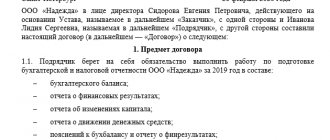Useful information » Articles on DDU » Warranty period under a contract Our team
Dmitry Dmitrievich Maksimov, Advocate. Work experience over 25 years Zimina Maria KirillovnaAdvocate. Work experience more than 15 years Eremin Vladimir TimofeevichAdvocate. More than 10 years of experience
A work contract is a signed agreement between the parties regarding the provision of a specific service (work) to the client by the contractor and the receipt of financial compensation as a result.
Like any other, a contract agreement at the legislative level is provided with a number of guarantees that are included to protect the rights of the parties.
Warranty obligations - what is it?
In essence, this is the obligation of the contractor to eliminate or correct its shortcomings and compensate for losses incurred by the counterparty.
An eloquent illustration is the guarantee under the contract, which ensures security and reliability for everyone involved in the transaction.
The result of the work must meet the agreements of the parties on quality for the entire warranty period established by the contract. The guarantee under the contract for the quality of completed work applies to all components of the work result (Article 722 of the Civil Code).
Note! The contract with the contractor does not include social guarantees.
Despite the existence of legal requirements for the provision of guarantees, when drawing up construction contracts, we recommend that the terms of the contract include:
- Responsibility to correct defects in work.
- The warranty period for the customer to file claims for correction of defects. The law establishes 1 year.
- Time period for completion and quality of contract work. In case of violation, the contractor will cover the losses.
- Guarantees to cover expenses incurred due to the fault of the parties to the transaction.
- Force majeure circumstances.
Keep in mind! If a defect is discovered after the agreed warranty period under the contract, performance can be demanded through the court.
A positive outcome can be expected if there is confirmation of a breakdown due to the fault of the contractor before the delivery of the project.
Controversial issues
The procedure for eliminating defects becomes significantly more complicated if the contractor does not agree with the claims presented. If you accepted the order, agreed that everything was done efficiently, and subsequently insist on the poor quality of the work, you must prove that the problems arose due to the fault of the contractor. The act of acceptance of the object acts as a weighty argument on the part of the contractor.
Only a competent examination can confirm your arguments. If the contractor disagrees with the assessment results, the issue is resolved in court.
No matter how much you would like to eliminate the shortcomings as quickly as possible, it is better not to do this on your own until a court decision is made. It will be easier for the judge to accept an objective assessment of the circumstances if the contractor insists on conducting a forensic examination of the construction work. Naturally, after correcting defects, a new expert assessment may give unexpected results.
To minimize risks and eliminate most controversial issues, you need to carefully approach the drafting of the contract and carefully select the contractor. To make the best decision, it is recommended to consult with a competent lawyer before entering into a relationship. A specialist can conduct a legal assessment of the contractor’s activities, provide you with examples of judicial practice regarding his activities, and also draw up the necessary documents to obtain a high-quality result of the work.
Did the article help you?
Have you found any deficiencies in the warranty period under a construction contract?
In this case:
— the consumer sends a request to the contractor to carry out repairs and eliminate deficiencies;
- the contractor can immediately begin to correct it or, in case of disagreement or doubt, conduct an independent examination. The warranty under the contract does not apply to an item that is not subject to use.
— in controversial cases, it is necessary to refer the conflict resolution to the court.
Note! If an enterprise is declared bankrupt, third parties are allowed to fulfill guarantee obligations. But they bear obligations for the quality of repair work to the contractor.
Is it possible to evade the warranty?
No, the warranty period under the contract is prescribed by law and evasion of it is regarded as an infringement and limitation of consumer rights.
Guarantee under a construction contract. In the event of construction procedures being carried out with a deviation from the contract, which reduced the quality and made the item unsuitable for use, the client has the right to make a claim about:
— free elimination of defects in optimal time;
— proportional reduction in the cost of work;
— compensation for investments arising from the elimination of violations and shortcomings.
The contractor, in turn, instead of eliminating the deficiencies for which he is responsible, has the right to perform the work again free of charge with compensation to the customer for damages caused by the delay in performance. Then the latter must return to the performer the previously transferred work result, provided that such a return is possible.
Attention! The customer has the right to refuse to fulfill the contract and demand compensation for losses caused if the defect was not eliminated within a reasonable period of time established by him or the defects are irreparable (Article 723 of the Civil Code).
Even if the contract itself exempts the performer from liability for specified defects, he nevertheless bears responsibility if it is proven that they arose through his fault.
Quality and responsibility
To talk about guarantees and the obligation to eliminate deficiencies, it is necessary to understand the concept of quality of work. Demands for the elimination of defects can only be made if the contract provides for a certain quality of the delivered order. You cannot demand that creaks in the floor be eliminated if you have ordered covering it with linoleum, which does not involve dismantling and re-placing wooden floorboards.
All important points for the parties must be specified in the contract. If certain quality standards are not marked separately, you will have to be guided by basic provisions and customs.
Careful drafting of the contractual text will allow you to arrive at a result that satisfies both parties. A detailed contract will help the contractor fully understand not only the requirements and expectations of the customer, but also his responsibility for fulfilling the order.
Warranty period under a construction contract
From the date of acceptance of the building into operation - 2 years, unless another period has been assigned. As for real estate, civil law sets a time limit for identifying violations and is equal to five years.
Important! It is possible to increase the warranty period under a contract only with the mutual consent of its participants.
One of the effective ways of guaranteeing a construction contract can be considered the retention by the customer of some financial part of the contractor until the expiration of the warranty period under the contract.
Another side is also possible: restraining the counterparty’s property by the other party (Article 359 of the Civil Code). In other words, the creditor keeps the thing. subject to transfer to the debtor until he repays the obligation to pay it.
However, it is worth noting that in the norms of the Civil Code such guarantee retention is absent and not directly stated, therefore, without a specific indication of it in the contract, it contradicts Art. 702 of the Civil Code on mandatory payment for completed orders.
Keep in mind! A penalty may be imposed on the amount of the guarantee retention as a percentage for late payment in the agreed amount or as specified in Art. 395 Civil Code.
That is why, when indicating a warranty lien in a contract, the customer should clearly indicate:
— what specific part of the payment for work performed by the contractor can be withheld;
- a specific time period giving the customer the right to withhold part of the payment,
— a condition for the unchangeable return of the retained guarantee in the event of cancellation or modification of the contract;
— the circumstances of offsetting the retained amount to cover the customer’s expenses for eliminating defects found during the warranty period.
In such situations, the court recognizes the legality of the warranty lien under a work contract, guided by the principle of freedom of contract (determined by the Supreme Arbitration Court of October 6, 2010 No. A40-91758/09-105-671).
Normative base
The law says that warranty periods must be specified in contracts concluded between the parties. The time frame for the validity of such guarantees is specifically stated in Articles 724 and 756 of the Civil Code of the Russian Federation.
Article 724 deals with the customer's rights to make claims if he discovers serious defects within a standard period of time. It also describes at what point the warranty period begins.
According to Article 756, any customer can count on a minimum warranty period of 24 months. During this time after completion of the project, the contractors can legally make claims.
The main regulatory act here becomes the Civil Code. In particular, articles 722 and 755. In addition, provisions of the law dedicated to the protection of consumer rights are often used.
This law allows you to resolve issues related to the reception and presentation of claims. Cases where the customer is an ordinary citizen and the work is performed specifically for his personal needs are examined separately.
What to do if the terms of the warranty are not met
The developer is evading the agreed guarantees, but everything has been done to fulfill them? The only way out is to restore your rights in court. The victim applies to the court with a statement of claim, in which he indicates the reasons, referring to the warranty periods under the construction contract or the law.
The claim is accompanied by an agreement and materials confirming the customer’s attempt to resolve the issue amicably, in the event of the contractor’s refusal. And if we are talking about warranty repairs, you should attach documents certifying the full payment for the work in due time.
Important! The court may remove the contractor from the obligation to fulfill the guaranteed obligations against the customer's debt if he has not paid the entire amount stipulated by the contract.
Item
The main part of this agreement is its subject matter. Thus, in the section on the subject, information is indicated about what kind of work the Contractor must perform. In the document text it looks like this:
In accordance with this agreement, the Customer undertakes to pay, and the Contractor undertakes to perform the following types of work:
- removing wallpaper;
- primer in two layers;
- putty in two layers;
- wallpapering walls.
The specified work is carried out in the Customer’s apartment, in a room 3.5 meters wide; length – 5 meters; 2.5 meters high. All necessary materials for the above work are provided by the Customer at his own expense.
Arbitrage practice
An analysis of the judicial practice of considering cases related to the warranty period allows us to conclude that it is recognized as legal for the customer to eliminate defects in the work performed on his own if the contractor has evaded fulfilling this duty, despite his repeated requests.
Regarding payment for work after it has been completed with omissions, the courts recognize the impossibility of returning payment and the need to eliminate defects during the warranty period. In the event that a deposit was given, it is possible to recover the difference by a proportionate reduction in the cost of the work, as unjustified enrichment.
Important! The presence of relevant expert findings confirming a precedent of violations does not at all guarantee an unconditional positive result in court.
In any case, the legislator certainly requires unconditional evidence of the contractor’s guilt in creating defects and quality that does not meet the contract. Otherwise, the outcome will not be in favor of the customer. And this is confirmed by the conclusions of court decisions.
The guarantee under the contract and the formation of its terms is an important part of the contractual relationship and should in no case be neglected. By regulating such an important aspect only legislatively, the parties lose the opportunity to protect their rights, which, in turn, leads to protracted litigation.
What period is given for correction?
There is a clear gap in determining the time period that is given to the developer to eliminate defects. The legislation does not contain a clear deadline for correction.
The only wording that is expressly used in regulations is “reasonableness.” The contractor has a “reasonable” time to correct. In practice, this means that the customer can independently determine when he wants to see a serviceable object.
Do not give too short a period. For example, it will not be possible to restore a load-bearing wall in 2 days. If the customer does not have the competence or construction specialty, then it makes sense to enlist the support of experts.
IMPORTANT! There is no point in delaying your claim. In Art. 755 clearly states: the customer is obliged to submit claims within the same reasonable period. If the procedure drags on, the court may rule in favor of the counterparty.
A guarantee is a tool that increases the reliability of work for the end consumer. Construction is an industry with increased responsibility, and the state understands this by providing customers with certain mechanisms to influence their counterparties.







